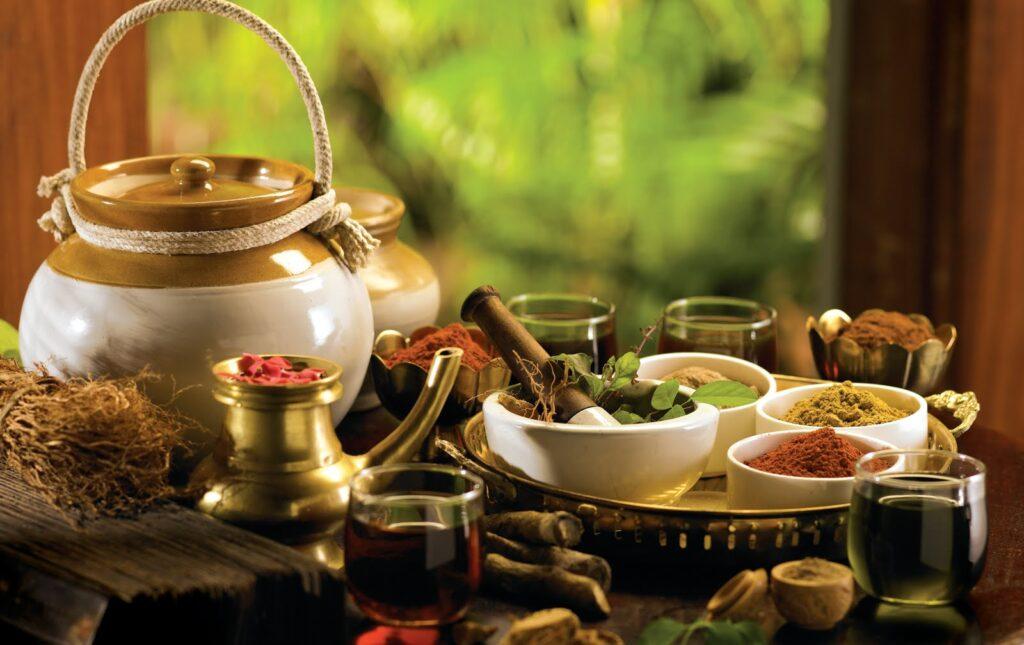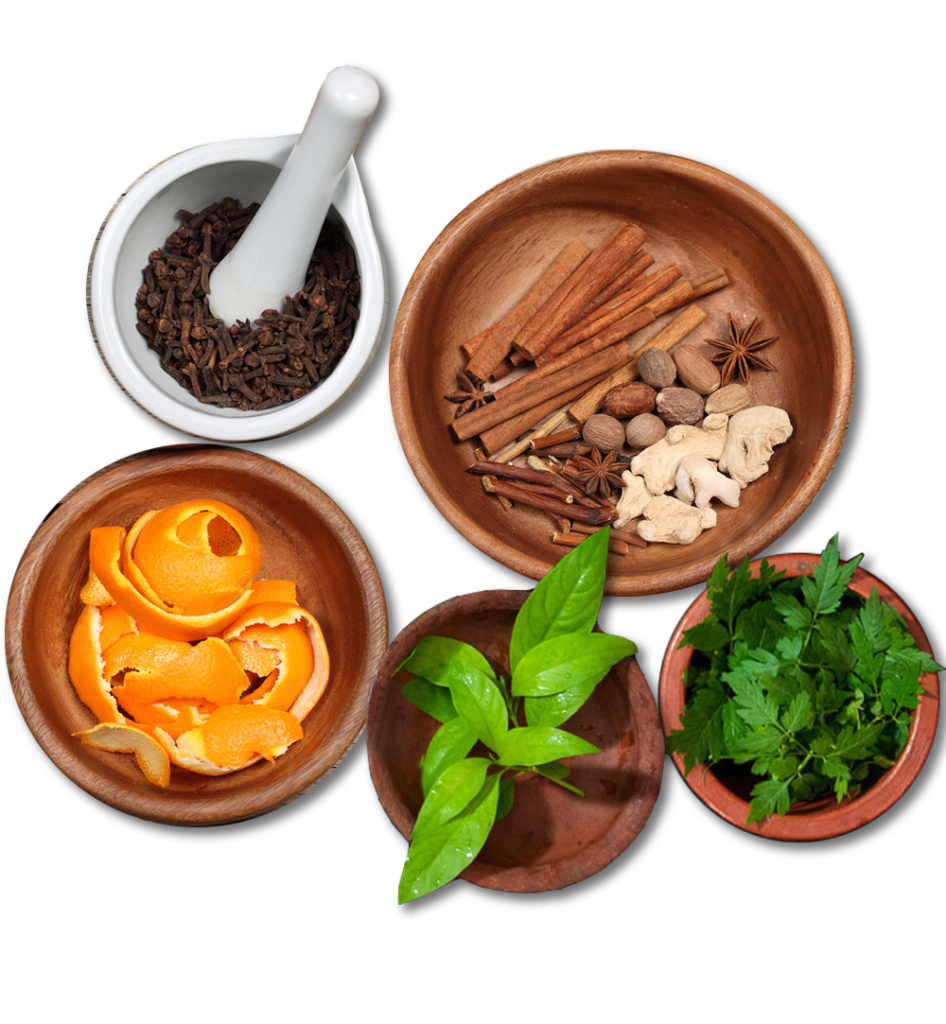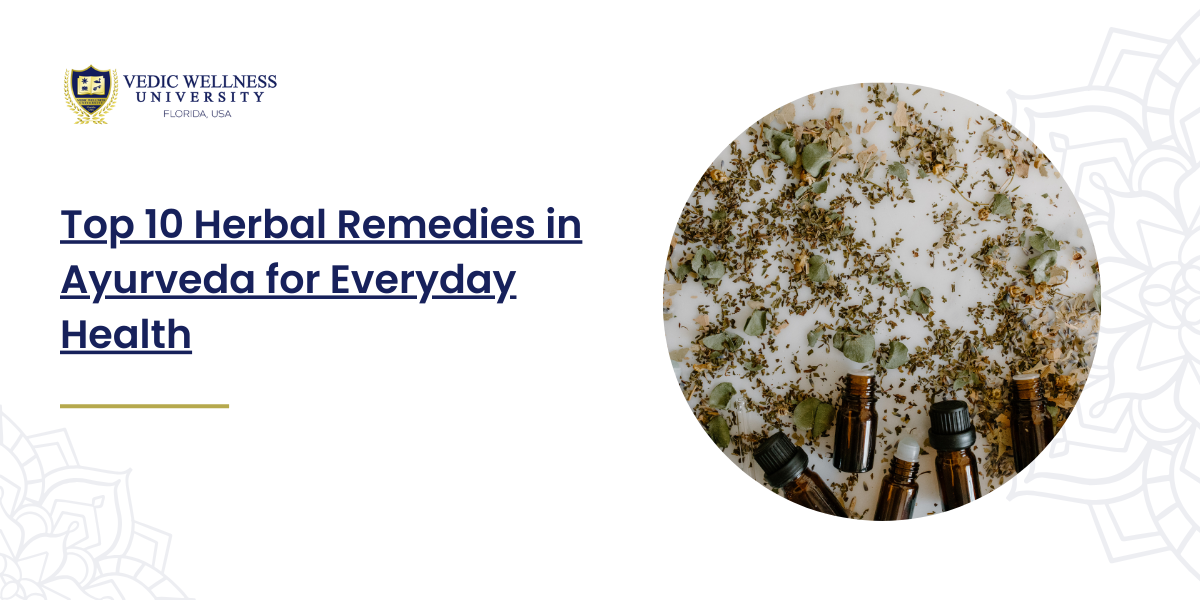Introduction
“सर्वे भवन्तु सुखिनः, सर्वे सन्तु निरामयाः।”
(Sarve Bhavantu Sukhinah, Sarve Santu Niramayah)
“May all be happy, may all be free from disease.”
- Brihadaranyaka Upanishad 1.4.14
This ancient shloka encapsulates the essence of Ayurveda, the traditional Indian system of medicine that aims to promote health and well-being for all. Ayurveda, which means “the science of life,” is a holistic approach to health that emphasizes balance in the body, mind, and spirit. Central to Ayurvedic practice are herbal remedies, which have been used for thousands of years to treat a wide range of ailments and promote overall health.
Importance of Herbal Remedies in Ayurveda
Herbal remedies are a cornerstone of the Ayurvedic healthcare system. They are derived from various parts of plants, including leaves, roots, bark, seeds, and flowers, and are used to balance the body’s doshas (Vata, Pitta, and Kapha) and support the body’s natural healing processes. In Ayurveda, each herb has specific properties that can help in treating diseases, boosting immunity, and maintaining overall health.
Herbal remedies are particularly valued for their natural origins and minimal side effects compared to synthetic medications. They are used to treat a wide variety of health conditions, from common colds and digestive issues to chronic diseases and mental health disorders. In addition to treating illnesses, Ayurvedic herbs are also used to enhance physical strength, mental clarity, and emotional stability.

Vital Herbs Used in Ayurveda
1. Ashwagandha (Withania somnifera)
Properties and Benefits: Ashwagandha, also known as Indian ginseng, is a powerful adaptogen that helps the body cope with stress. It enhances stamina, boosts immunity, and improves overall vitality.
Uses:
- Reduces stress and anxiety
- Enhances cognitive function
- Boosts energy and stamina
- Supports thyroid function
How to Use: Ashwagandha can be consumed as a powder mixed with milk or water, or taken in capsule form. It is commonly found in health food stores and Ayurvedic shops worldwide.
2. Turmeric (Curcuma longa)
Properties and Benefits: Turmeric is renowned for its anti-inflammatory and antioxidant properties. The active compound, curcumin, is effective in reducing inflammation and supporting joint health.
Uses:
- Reduces inflammation
- Supports joint and muscle health
- Enhances liver function
- Boosts immune system
How to Use: Turmeric can be added to food as a spice or taken as a supplement in powder or capsule form. It is widely available in grocery stores and herbal shops.
3. Tulsi (Ocimum sanctum)
Properties and Benefits: Tulsi, or holy basil, is revered in Ayurveda for its medicinal properties. It is a powerful adaptogen that supports respiratory health and reduces stress.
Uses:
- Supports respiratory health
- Reduces stress and anxiety
- Boosts immunity
- Enhances digestion
How to Use: Tulsi leaves can be brewed as tea, used in cooking, or taken as a supplement. It is commonly available in health food stores and Ayurvedic shops.
4. Ginger (Zingiber officinale)
Properties and Benefits: Ginger is widely used in Ayurveda for its digestive and anti-inflammatory properties. It aids digestion, reduces nausea, and supports cardiovascular health.
Uses:
- Aids digestion
- Reduces nausea
- Supports cardiovascular health
- Relieves pain and inflammation
How to Use: Ginger can be consumed fresh, as a tea, or in powdered form. It is readily available in grocery stores and herbal shops.
5. Neem (Azadirachta indica)
Properties and Benefits: Neem is known for its antibacterial, antifungal, and antiviral properties. It supports skin health and detoxifies the body.
Uses:
- Supports skin health
- Detoxifies the body
- Boosts immunity
- Supports oral health
How to Use: Neem can be used in various forms, including capsules, powders, oils, and soaps. It is available in Ayurvedic and health food stores.
6. Amla (Emblica officinalis)
Properties and Benefits: Amla, or Indian gooseberry, is rich in vitamin C and antioxidants. It supports immune function and enhances skin and hair health.
Uses:
- Boosts immunity
- Enhances skin and hair health
- Supports digestive health
- Promotes cardiovascular health
How to Use: Amla can be consumed fresh, as juice, or in powdered form. It is widely available in health food stores and Ayurvedic shops.
7. Brahmi (Bacopa monnieri)
Properties and Benefits: Brahmi is a powerful herb for cognitive enhancement. It improves memory, reduces stress, and supports mental clarity.
Uses:
- Enhances cognitive function
- Reduces stress and anxiety
- Supports mental clarity
- Improves memory
How to Use: Brahmi can be taken as a supplement in capsule or powder form, or brewed as tea. It is available in health food stores and Ayurvedic shops.
8. Triphala
Properties and Benefits: Triphala is a combination of three fruits: Amla, Haritaki, and Bibhitaki. It supports digestive health and detoxification.
Uses:
- Supports digestive health
- Promotes detoxification
- Enhances immune function
- Supports weight management
How to Use: Triphala is commonly taken as a powder mixed with water or as a capsule. It is available in Ayurvedic and health food stores.
9. Shatavari (Asparagus racemosus)
Properties and Benefits: Shatavari is known for its benefits in women’s health. It supports reproductive health, balances hormones, and enhances lactation.
Uses:
- Supports reproductive health
- Balances hormones
- Enhances lactation
- Boosts immunity
How to Use: Shatavari can be taken as a powder mixed with milk or water, or as a supplement in capsule form. It is available in health food stores and Ayurvedic shops.
10. Licorice (Glycyrrhiza glabra)
Properties and Benefits: Licorice is known for its soothing properties. It supports respiratory health, soothes the digestive tract, and reduces inflammation.
Uses:
- Supports respiratory health
- Soothes digestive tract
- Reduces inflammation
- Boosts immunity
How to Use: Licorice can be consumed as tea, in powder form, or as a supplement. It is available in health food stores and Ayurvedic shops.

Top 10 Herbal Remedies in Ayurveda
1. Ashwagandha for Stress and Anxiety
Where to Find: Ashwagandha is widely available in health food stores, Ayurvedic shops, and online retailers.
How to Take:
- Ashwagandha can be taken as a powder mixed with warm milk or water.
- It is also available in capsule form.
Diseases it Can Cure:
- Stress and anxiety
- Fatigue
- Insomnia
- Low immunity
Other Details: Ashwagandha’s adaptogenic properties make it an excellent remedy for reducing stress and anxiety. It also supports overall vitality and strengthens the immune system. For best results, it is recommended to take Ashwagandha daily, preferably in the evening.
2. Turmeric for Inflammation and Joint Health
Where to Find: Turmeric is commonly found in grocery stores, health food stores, and online retailers.
How to Take:
- Turmeric can be added to food as a spice.
- It can also be taken as a supplement in capsule or powder form.
Diseases it Can Cure:
- Inflammation
- Arthritis
- Digestive disorders
- Skin conditions
Other Details: The active compound in turmeric, curcumin, is known for its potent anti-inflammatory and antioxidant properties. Regular consumption of turmeric can help reduce inflammation, support joint health, and improve digestive function. It is often recommended to take turmeric with black pepper to enhance its absorption.
3. Tulsi for Respiratory Health and Immune Support
Where to Find: Tulsi is available in health food stores, Ayurvedic shops, and online retailers.
How to Take:
- Tulsi leaves can be brewed as tea.
- It is also available in capsule and tincture form.
Diseases it Can Cure:
- Respiratory infections
- Colds and flu
- Stress and anxiety
- Digestive issues
Other Details: Tulsi, also known as holy basil, is revered in Ayurveda for its adaptogenic and immune-boosting properties. It supports respiratory health, reduces stress, and enhances digestion. Tulsi tea can be consumed daily for overall health and well-being.
4. Ginger for Digestive Health and Nausea
Where to Find: Ginger is readily available in grocery stores, health food stores, and online retailers.
How to Take:
- Ginger can be consumed fresh, as tea, or in powdered form.
- It is also available in capsule form.
Diseases it Can Cure:
- Digestive disorders
- Nausea and vomiting
- Inflammation
- Cold and flu symptoms
Other Details: Ginger is widely used in Ayurveda for its digestive and anti-inflammatory properties. It helps improve digestion, reduce nausea, and support cardiovascular health. Fresh ginger tea is an effective remedy for nausea and digestive discomfort.
5. Neem for Skin Health and Detoxification
Where to Find: Neem is available in health food stores, Ayurvedic shops, and online retailers.
How to Take:
- Neem can be used as a powder, oil, or in capsule form.
- It is also available in skincare products like soaps and creams.
Diseases it Can Cure:
- Skin conditions (acne, eczema, psoriasis)
- Infections
- Digestive disorders
- Oral health issues
Other Details: Neem is known for its powerful antibacterial, antifungal, and antiviral properties. It supports skin health, detoxifies the body, and boosts immunity. Neem oil can be applied topically for skin issues, while neem powder or capsules can be taken internally for detoxification.
6. Amla for Immunity and Skin Health
Where to Find: Amla is widely available in health food stores, Ayurvedic shops, and online retailers.
How to Take:
- Amla can be consumed fresh, as juice, or in powdered form.
- It is also available in capsule form.
Diseases it Can Cure:
- Immunity issues
- Skin conditions
- Digestive disorders
- Cardiovascular health
Other Details: Amla, or Indian gooseberry, is rich in vitamin C and antioxidants. It boosts immunity, enhances skin and hair health, and supports digestive function. Amla juice or powder can be taken daily for overall health benefits.
7. Brahmi for Cognitive Function and Mental Clarity
Where to Find: Brahmi is available in health food stores, Ayurvedic shops, and online retailers.
How to Take:
- Brahmi can be taken as a supplement in capsule or powder form.
- It can also be brewed as tea.
Diseases it Can Cure:
- Cognitive decline
- Stress and anxiety
- Memory issues
- Mental fatigue
Other Details: Brahmi is known for its cognitive-enhancing properties. It improves memory, reduces stress, and supports mental clarity. Brahmi supplements can be taken daily to enhance cognitive function and reduce anxiety.
8. Triphala for Digestive Health and Detoxification
Where to Find: Triphala is available in health food stores, Ayurvedic shops, and online retailers.
How to Take:
- Triphala can be taken as a powder mixed with water.
- It is also available in capsule form.
Diseases it Can Cure:
- Digestive disorders
- Constipation
- Detoxification
- Immune support
Other Details: Triphala is a combination of three fruits: Amla, Haritaki, and Bibhitaki. It supports digestive health, promotes detoxification, and enhances immune function. Triphala powder can be taken daily for digestive support and detoxification.
9. Shatavari for Women’s Health
Where to Find: Shatavari is available in health food stores, Ayurvedic shops, and online retailers.
How to Take:
- Shatavari can be taken as a powder mixed with milk or water.
- It is also available in capsule form.
Diseases it Can Cure:
- Hormonal imbalances
- Reproductive health issues
- Lactation problems
- Immune support
Other Details: Shatavari is known for its benefits in women’s health. It supports reproductive health, balances hormones, and enhances lactation. Shatavari supplements can be taken daily to support hormonal balance and reproductive health.
10. Licorice for Respiratory and Digestive Health
Where to Find: Licorice is available in health food stores, Ayurvedic shops, and online retailers.
How to Take:
- Licorice can be consumed as tea, in powder form, or as a supplement.
- It is also available in lozenges and syrups for respiratory health.
Diseases it Can Cure:
- Respiratory issues
- Digestive disorders
- Inflammation
- Immune support
Other Details: Licorice is known for its soothing properties. It supports respiratory health, soothes the digestive tract, and reduces inflammation. Licorice tea or supplements can be taken daily for respiratory and digestive support.
Conclusion
“अयं निजः परो वेत्ति गणना लघुचेतसाम्।
उदारचरितानां तु वसुधैव कुटुम्बकम्॥”
(Ayam Nijah Paro Vetti Ganana Laghuchetasam,
Udaracharitanam Tu Vasudhaiva Kutumbakam)
“This is mine, that is yours, is the calculation of the narrow-minded. For the magnanimous, the whole world is a family.”
- Maha Upanishad 6.71-73
Herbal remedies in Ayurveda offer a holistic approach to health and well-being, harnessing the natural healing properties of plants to treat and prevent diseases. By incorporating these remedies into our daily lives, we can support our body’s natural healing processes and maintain optimal health. At Vedic Wellness University, we are committed to promoting the ancient wisdom of Ayurveda and integrating it with modern practices to foster a global community of health and wellness.


